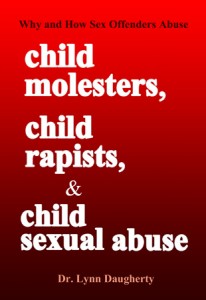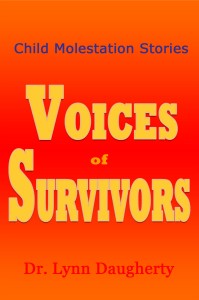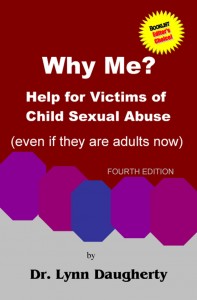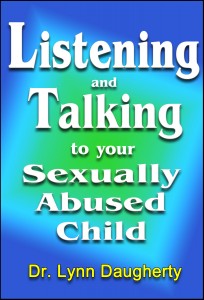Dr. David Finklehor’s Model for Understanding Child Sexual Abuse
A selection from Dr. Lynn Daugherty’s book, Child Molesters, Child Rapists, and Child Sexual Abuse
(Child sexual abuse trigger warning and disclaimer)

Paperback US $9.95
Available from these booksellers.
Many have tried to understand and explain why child sexual abuse takes place. Some have focused on the personality of the abuser or the victim. Others have pointed to biological factors or to pressures within our society.
It is never easy to explain “why” anything happens. Right now, although we have many theories about child sexual abuse, we have even more questions. No one really knows “why” child sexual abuse takes place. We do know what conditions are necessary for child sexual abuse to take place, however.

Paperback $7.95.
Available from these booksellers.
The Four Pre-Conditions Model of Child Sexual Abuse
Dr. David Finkelhor, Director of the Crimes Against Children Research Center at the University of New Hampshire, and his colleagues have proposed a comprehensive model that identifies four factors necessary for child sexual abuse to take place. This model gives us a basis for understanding how child sexual abuse can happen. Dr. Finkelhor calls each of the four factors a “pre-condition.” When all four pre-conditions are present, child sexual abuse can occur. When any one is missing, child sexual abuse will not take place.

Paperback $12.95 (US).
Available from these booksellers.
Pre-Condition 1. The potential child sexual abuser must have some motivation to have sex with the child. The potential molester or rapist must, first of all, want to have sex with the child in order for child sexual abuse to take place. This motivation may come from any of several sources:
(1) The abuser’s primary sexual orientation is toward children.
Some abusers are motivated to have sex with children because they are sexually aroused primarily by children. They have sex with children because they find children more sexually exciting than adults. They prefer to have sex with children rather than with people in their own age group.

Paperback $7.95 (US).
Available from these booksellers.
Where does this primary sexual orientation toward children come from? Some suggest that genetic factors may make some individuals more easily sexually aroused by children. Others point to factors in the abuser’s personal history or environment, suggesting that some individuals may have learned to become sexually aroused by children because of early sexual experiences with other children or because of child pornography or advertisements that portray children in sexual ways. Some abusers may mistake strong emotional feelings for children as “sexual” when others would identify them as “parental” or “affectionate.” Others may have learned only too well what our society teaches: the most desirable sexual partners are youthful and subservient.
(2) The abuser’s primary sexual orientation is toward peers, but the abuser turns to children as a substitute when preferred sexual partners are not available.
Some abusers prefer sexual activity with adults, and only turn to children as a “second choice” to meet their sexual needs when adult sexual partners are not available. The abuser’s adult partner may be absent, ill, uncooperative, or otherwise unavailable so the abuser has sex with a child as an alternative way of achieving sexual gratification. Repressive teachings about sex, early unresolved conflicts regarding parental figures, traumatic sexual experiences with adults, blows to self-esteem, or lack of social skills can also cause individuals to avoid social or sexual relationships with adults temporarily or permanently. Instead, these individuals turn to children as less threatening alternatives.
(3) The abuser is seeking to meet non-sexual emotional needs by having sex with children.
Some abusers may be trying to satisfy important emotional needs which have nothing to do with sex, such as the need to be liked, or the need for excitement, the need to feel powerful, or the need to be in control of another person. Some abusers try to fulfill these emotional needs through sexual activity with children.
Any of these motivations, or elements of several of these, may lead the abuser to sexual activity with children.
Pre-Condition 2. The potential abuser must overcome his or her own inhibitions against sexual activity with a child. The potential abuser must find a way around whatever stops him or her from acting on the desire to have sex with a child, whether it is conscience or a fear of punishment.
Some abusers have few internal inhibitions against sexual activity with children. Some of these, called sociopaths, are people who do not care about any rules of society that interfere with their own desires. Their only concern is how to avoid getting into trouble for their actions.
Others, whose consciences would normally stop them from hurting anyone, have trouble recognizing or believing that child sexual abuse can cause children harm. This comes from either from lack of knowledge or through denial, that is, by hiding the unwelcome truth from themselves. Still others may truly believe that sexual activity with children is appropriate under certain conditions.
Many people think about having sexual activity with a child at some time or another. Most of us stop ourselves from doing it. For most of us, our internal inhibitions against this type of behavior or our fear of getting in trouble are stronger than our motivations to do it. Most people who sexually abuse children also have inhibitions against sexual activity with children, but in certain situations their other emotional or sexual needs become strong enough to overcome their inhibitions.
Some abusers reduce their normally adequate inhibitions against child sexual abuse temporarily by using alcohol or other drugs. This may be purposeful or may result from unplanned situational circumstances.
High levels of stress can also work to overcome inhibitions against child sexual abuse. Stress makes it difficult to think clearly, and also makes us uncomfortable in physical and psychological ways. Then the pressures to satisfy sexual or emotional needs can overpower normal inhibitions.
Rarely, abusers have serious mental or emotional problems that interfere with their thinking, and reduce their ability to control their behavior appropriately. Mental retardation, brain damage, senility, or serious mental illness such as schizophrenia, can lead to problems with judgment and behavioral controls and these can reduce the person’s inhibitions against sexual activity with children. Most individuals with these problems do not abuse children, however.
The influence of society can strengthen or weaken an individual’s inhibitions against child sexual abuse. Society reduces inhibitions against child sexual abuse when it tolerates or encourages sexual interest in children through child pornography or child prostitution. Society also reduces inhibitions against child sexual abuse when criminal sanctions against child sexual abuse are weak or uncertain.
Pre-Condition 3. The opportunity to engage in sexual activity with a child must arise. The potential abuser must get a chance to be with the potential victim, usually alone.
The more time a child spends away from appropriate supervision, the greater is the opportunity for abuse. Physical separation of the child from others is usually necessary for abuse to occur, but emotional or social isolation can also play an important role in giving the potential abuser access to a child. A child who is physically or emotionally “alone” becomes more easily accessible to an abuser.
Generally, the type of access the abuser has to the child determines the type of abuse that can take place. Different types of physical and emotional access lead to brief incidents of abuse, to abuse in a continuing relationship, or to incest.
Pre-Condition 4. The resistance of the child to the sexual activity must be overcome. The abuser must find a way to get around whatever resistance the child puts up.
Children do have some capacity to avoid or resist abuse, and often do so. They are usually at a disadvantage in the confrontation, however, because of the greater knowledge, power, or authority of the abuser. Some abusers use this superior knowledge, power, or authority to overpower the resistance of the child. Others exploit the physical or emotional needs of the child to overcome resistance.
Some children, especially younger children, may not know that sexual activity with the abuser is wrong. Others may sense that something is wrong but accept the explanations or assurances of the abuser because he or she is older and has more knowledge or authority. Some older children who know the activity is wrong simply do not know how to deal with the difficult situation. Others have been taught to obey adults without question.
Abusers may overcome the child’s resistance through physical force or fear. Fears are many. They range from fear of physical harm to embarrassment, shame, fear of hurting others or fear of losing valuable companions or family members.
Abusers may take advantage of a child’s need for attention, love, or companionship to overcome resistance to sexual activity. The child who feels emotionally needy will be much more vulnerable to the attentions of an abuser than the child who is confident in the love and concern of others, as well as in his or her own self-worth.
Children living “on their own” are especially vulnerable to those who will provide food, shelter, or money in exchange for sexual activity. Runaways often become prostitutes to provide themselves with the basic physical necessities of life.
When child sexual abuse has occurred Dr. Finkelhor’s model helps us understand how it happened. We can see that the abuser has been motivated to have sexual activity with a child and has overcome whatever inhibitions he or she had against this activity. The abuser had an opportunity to be with the victim and overcame the victim’s resistance to the sexual activity. If any one of the pre-conditions had not been present, child sexual abuse would not have occur. All four pre-conditions came together, and the child sexual abuse took place.
Read real stories of victims of child molestation, rape, or incest.

Paperback US $7.95
At Amazon.com and most booksellers

Paperback US $12.95
At Amazon.com and most booksellers

Paperback US $9.95
At Amazon.com and most booksellers
How and why do child molesters and rapists abuse children?
How do molestation, rape, or incest affect a child? Find other Questions and Answers about child sexual abuse as well as help and healing for victims.
Has your child been abused? Learn how to help your sexually abused child by listening and talking.

Paperback US $7.95
At Amazon.com and most booksellers
© Cleanan Press, Inc. 2004 – 2020
